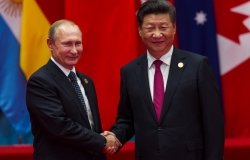Book Launch: <i>Pakistan: Beyond the "Crisis State"</i>
A book launch for a new edited volume by Maleeha Lodhi, a former Wilson Center Public Policy Scholar and Pakistani ambassador to Washington, about how to overcome Pakistan's many challenges. Additional commentary from several other book contributors.
Overview
There is no shortage of gloomy commentary about Pakistan these days. Such perspectives, according to Maleeha Lodhi, largely come from non-Pakistanis who prefer to focus on problems rather than on solutions. On April 28, the Wilson Center hosted a book event for Lodhi's new edited volume, Pakistan: Beyond the "Crisis State". Its chapters are all written by Pakistanis, and examine not only the country's many challenges, but also how to overcome them.
The book's main theme, explained Lodhi, a former Public Policy Scholar at the Wilson Center, revolves around the paradox of Pakistan as a weak state and a strong society. Most outsiders base their impressions of Pakistan on the former, and therefore forecast the country's fall. Yet thanks to Pakistani society's strong faith in its ability to persevere, such a scenario has not come to pass. She noted, for example, how Pakistanis have bounced back from last year's destructive floods with "an endurance of spirit" rarely captured in the writing on Pakistan. Beyond the "Crisis State" focuses on this resilience.
The book features a chapter by Lodhi on governance challenges. Pakistan is experiencing many promising transitions, such as urbanization and the rapid rise of a middle class, yet the country has so far been unable to capitalize on them. According to Lodhi, this is because Pakistan's political system remains one of patronage—it responds to the needs of political supporters, not of the citizenry on the whole. She asserted that even the Benazir Income Support Program, a cash transfer scheme that receives ample U.S. funding, amounts to "pure patronage," given that it only assists supporters of the ruling Pakistan People's Party. To move beyond such state favoritism, she said, Pakistan badly needs to pass political and electoral reforms—and this will require political will.
Ziad Alahdad, an energy specialist who spent 25 years at the World Bank, discussed his book chapter on energy challenges. One of these is circular debt: Revenues are insufficient to meet the costs of production, and so power suppliers are going broke. As a result, Pakistanis currently suffer through daily power outages of 12 to 18 hours. Additionally, policymakers continually neglect non-commercial (household) energy use in Pakistan. This type of energy use draws on traditional power sources like dung and firewood, and half the country's population relies on it. To surmount these challenges, Alahdad concluded, Pakistan must develop an integrated energy planning model that gives proper attention to both commercial and non-commercial energy use.
Ziad Haider, a dual degree candidate at Georgetown University Law Center and Harvard University's Kennedy School, spoke about his chapter on the role of religion in Pakistan's development. While many assume that the state began appropriating religion for its own purposes during the rule of Mohammad Zia ul-Haq (1977-1988), Haider noted that this has in fact been done over Pakistan's entire history. For example, the state has frequently utilized religion to promote nation-building; Pakistan's leaders have often embraced religion as an ideology to bring the country together. More recently, however, non-state actors have exploited religion, with militant organizations using it to oppose the state and claiming that Pakistan's problems will disappear only if the country becomes more Islamic.
All three speakers concurred that Pakistan's salvation lies within. The country' problems and solutions both originate at home, Lodhi said, and the book's contributors are united in their belief that change can only come from the inside. Haider pointed to the dynamic nature of Pakistani civil society, which often protests against terrorism and has "offered up bits and pieces" of a counternarrative to contest religious extremism. Alahdad noted that in times of crisis, it is tempting for outside analysts to dispense prescriptive solutions. Yet he argued that it is more important to build the capacities of the Pakistani people, so that they can develop and implement the policies Pakistan needs to move forward.
By Michael Kugelman
Robert M. Hathaway, Director, Asia Program
Speakers
Hosted By

Indo-Pacific Program
The Indo-Pacific Program promotes policy debate and intellectual discussions on US interests in the Asia-Pacific as well as political, economic, security, and social issues relating to the world’s most populous and economically dynamic region. Read more
Thank you for your interest in this event. Please send any feedback or questions to our Events staff.










